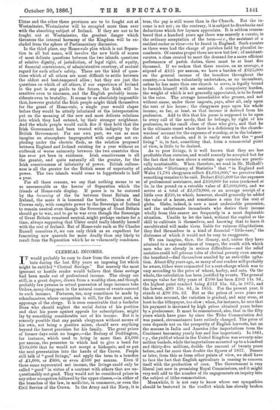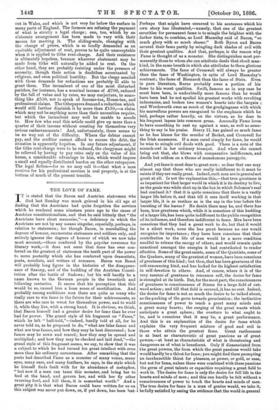CLERICAL INCOMES.
IT would probably be easy to draw from the records of pro- bate during the last fifty years an imposing list which might be entitled "Clerical Savings." But scarcely the most ignorant or hostile reader would believe that these savings had been made out of professional income. The clergy are still, in a great degree, drawn from a wealthy class, and though probably few persons in actual possession of large incomes take Orders, many clergymen in the natural course of events succeed to such incomes. Fortunes, too, may sometimes be made by schoolmasters, whose occupation is still, for the most part, an appanage of the clergy. It is even conceivable that a bachelor Dean who should neglect the social duties of his position and shut his purse against appeals for subscriptions, might lay by something considerable out of his income. But it is scarcely possible that any parish clergyman without means of his own, not being a positive miser, should save anything beyond the barest provision for his family. The great prizes of former days exist no longer,—the Rectory of Doddington, for instance, which used to bring in more than £4,000 per annum, the presentee to which had to give a bond for £100,000 that he would not accept a bishopric, and so put the next presentation into the hands of the Crown. People still talk of "good livings," and apply the term to a benefice of £1,000, or £800, or even .2500 per annum. Even if these sums represented net income, the livings could only be called "good" in virtue of a contrast with others that are un- questionably not good. They would not be considered prizes in any other occupation followed by the upper classes,—in either of the branches of the law, in medicine, in commerce, or even the Civil Service of the Crown. In the Army and the Navy, it is true, the pay is still worse than in the Church. But the in- come is not net ; on the contrary, it is subject to drawbacks and deductions which few laymen appreciate. It is seldom remem- bered that a hundred years ago there was scarcely a curate, in the ordinary acceptation of the term—i.e., the assistant of a resident rector or vicar—to be found in England. Such curates as there were had the charge of parishes held by pluralist in- cumbents. Of curates proper there are now but few; of assistant- curates, a class created to meet the demand for a more efficient performance of parish duties, there must be at least five thousand. If we reckon that these receive, on an average, a stipend of £125 per annum, we have a burden of £625,000. on the general income of the benefices throughout the country,—a burden voluntarily undertaken, as no incumbent, unless he has more than one church to serve, is legally bound to furnish himself with an assistant. A compulsory burden, the weight of which is not generally appreciated, is to be found in the rates. The average householder who groans, and not without cause, under these imposts, pays, after all, only upon the rent of his house ; the clergyman pays upon his whole income, so far, at least, as that income is derived from his profession. Add to this that his purse is supposed to be open. to every call of the needy, that he belongs, by right of his profession, to the small class of those who give, and that he is the ultimate resort when there is a deficiency in the church- wardens' account for the expenses of worship, or in the balance- sheet of the schools, and it is easily seen that the "good living" is, in fact, something that, from a commercial point of view, is little to be desired.
As to poor livings, it is well known that they are less profitable than curacies, and would scarcely be accepted but for the fact that for men above a certain age curacies are practi- cally unattainable. When, therefore, we read in Mr. Mulhall's admirable "Dictionary of Statistics" that "in England and Wales 11,784 clergymen collect £4,054,000," we perceive that something remains to be said. Deduct £625,000 for the expenses of professional assistance, and £450,000 for rates (reckoned at. 3s. in the pound on a rateable value of £3,000,000), and we arrive at a total of £2,979,000, or an average receipt of a little over £250, to which, however, should generally be added the value of a house, and sometimes a sum for the rent of glebe. Glebe, indeed, is now a most undesirable possession, and the unfortunate incumbents who derive their income wholly from this source are frequently in a most deplorable situation. Unable to let the land, without the capital or the skill to cultivate it themselves, and knowing that to leave it uncultivated will make them liable for ruinous dilapidations, they find themselves in a kind of financial "little-ease," the distresses of which it would not be easy to exaggerate.
We can imagine, then, the dismay, and, unless they have attained to a rare saintliness of temper, the wrath with which men who are already in serious difficulties—and the relief societies could tell piteous tales of clerical poverty even among the beneficed—find themselves assailed by an anti-tithe agita- tion. About fifty years ago, as many of our readers will probably be aware, tithes were commuted for a rent-charge which was to vary according to the price of wheat, barley, and oats. On the whole, the calculation has been justified by events. The general average value for fifty years of £100 has been £102 us. 9d.,.
the highest point reached being £112 15s. 6d., in 1875, and the lowest, £89 15s. 8d., in 1855. For the present year, it stands at £90 10s. 3d. But as the prices of seven years are taken into account, the variation is gradual, and may seem, at least to the tithepayer, too slow ; when, for instance, he sees that his payment is increased by high prices obtained years before by a predecessor. It must be remembered, also, that in the fifty years which have gone by since the Tithe Commutation Act was passed, circumstances have entirely changed. The price of corn depends not on the prosperity of English harvests, but on the seasons in India and America (the importations from the
Continent becoming yearly less and less important). In 1881, e g , the yield of wheat in the United Kingdom was seventy-nine
million bushels, while the importations mounted up to a hundred and thirty-five millions, double the amount of twenty years before, and far more than double the figures of 1837. Sooner or later, from this as from other points of view, we shall have to face the fact that English agriculture is ceasing to concern itself with the production of corn. The Government is very liberal just now in promising Royal Commissions, and it might very well add to the number of its engagements an inquiry into the subject of tithe-commutation.
Meanwhile, it is not easy to know where our sympathies should be bestowed in the conflict which has already broken out in Wales, and which is not very far below the surface in many parts of England. The farmers are refusing the payment of what is strictly a legal charge ; one, too, which by an elaborate arrangement has been made to vary with their means for meeting it. The sliding-scale, changing with the change of prices, which is so loudly demanded as an equitable adjustment of rent, proves to be quite unacceptable when it is applied to tithe rent-charge. And their resistance is ultimately hopeless, because whatever abatement may be made from tithe will naturally be added to rent. On the other hand, they are probably resisting under the pressure of necessity, though their action is doubtless accentuated by religious, and even political hostility. But the clergy assailed with these demands for reductions are probably ill able to grant them. The incumbent of one of the most disturbed parishes, for instance, has a nominal income of £700, reduced by the fall of value and by rates, we may conjecture, to some- thing like .2550, not to speak of Income-tax, House-tax, and professional claims. The tithepayers demand a reduction which would still further diminish it by more than £150,—a claim which may not be anything more than their necessities require, but which the incumbent may well be unable to accede to. How few who read this article could give up more than a quarter of their income without creating for themselves very serious embarrassments ! And, unfortunately, there seems to be no way out of the difficulty. Where the debtor cannot pay, and the creditor cannot afford to excuse the debt, the situation is apparently hopeless. In any future adjustment, if the tithe rent-charge were to be reduced, the clergyman might be relieved by having to pay rates only on the value of his house, a considerable advantage to him, which would impose a small and equally distributed burden on the other ratepayers. The legal fiction—for so we may call it—that what a man receives for his professional services is real property, is at the bottom of much of the present trouble.





































 Previous page
Previous page